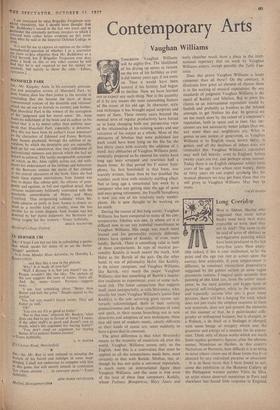Contemporary Arts
Vaughan Williams
TOMORROW Vaughan Williams will be eighty-five. The likelihood of his drying up seems as remote on the eve of his birthday as ever it did twenty years ago, if not more so. Then it would have been Anatural if his fertility had begun to decline. Now we have learned not to expect any such thing. Nor is the quantity of it by any means the most astonishing feature of the music of his old age. In character, style and technique it has brought equal surprises and more of them. These twenty years beyond the normal term of regular productivity have forced us to keep changing both our perspective view of the relationship of his existing works and our valuation of his output as a whole. Most of the obituaries of Sibelius that were published last week could have been lying on the file for the last thirty years with scarcely the addition of I word. Any obituaries of Vaughan Williams pessi- mistically prepared as he entered his sixties have long ago been scrapped and rewritten half a dozen times. At that period his F minor Sym- phony, his first bombshell in that form, was scarcely written. Since then he has doubled the number, each time with similarly startling effect. Not so long ago a sensational late work by a composer who was getting near the age of quiet and easy-going retirement, the Fourth Symphony is now just one of his relatively early master- pieces. He is now thought to be working on his ninth.
During the course of this long career, Vaughan Williams has been compared to many of his con- temporaries. Sibelius was one, in whose art it is difficult now to see any essential resemblance to Vaughan Williams. His range was much more limited and his personality entirely different. Others have spoken of Kbdaly, or even, more boldly, Bart6k. There is something valid in both of these comparisons. In type of musical per- sonality Kodaly is much nearer the mark, with Hoist as the Bartok of the pair. On the other hand, in size of persortality Hoist, like Koddly, is the minor composer, and Vaughan Williams, like Bartok, very much the major. Vaughan Williams also has something of Bartok's inquisi- tive readiness to experiment, even at some tech- nical risk. The latest comparison that suggests itself, most unexpectedly, is with Stravinsky, who, exactly ten years Vaughan Williams's junior (like Kodaly), is the sole surviving great master uni- versally acknowledged—,Both in their untiring productiveness and in their youthfulness of mind and spirit, in their recent branching out in new directions and adoption of new techniques, these two old men of modern music, utterly different as their kinds of music are; seem suddenly to have a great deal in common.
The great difference is that what Stravinsky means to the majority of musicians all over the world, Vaughan Williams means only to the English. And this is a reservation that must be applied to all the comparisons made here, most certainly to that with Bartok. Sibelius, too, al- though he has not quite a universal reputation, is much more an international figure than Vaughan Williams, and the same is true even of the least of these four ,composers, Koddly, whose Psalmus Hungaricus, Hary. ftinos and early chamber musi'c have a place in the inter- national repertory that no work by Vaughan Williams enjoys, except possibly the Tullis Fan- tasia.
Does this prove Vaughan Williams a lesser .composer than all these? On the contrary, it illustrates how great an element of chance there is in the making of musical reputations. By any Standards of judgment Vaughan Williams is the equal of Kocitily and Sibelius. But to press his claims to an international- reputation would be foolish and probably as fruitless. as the belated attempts to get Nielsen his due: In general we set too much store by the extent.-of a composer's reputation, both in space and in time. Our suc- cessors are not necessarily better judges than we, any more than our, neighbours are. •What is genius to one nation or generation, as Vaughan Williams is to English music lovers tbdity, is genius, and all the deafness, of others .does not contradict this. Vaughan •Williams's reputation may well fall heavily, even in England, before twenty years are out, and perhaps never recover. Today there is no English composer within forty years of his age from whose next twenty, thirty or forty years we can expect anything like, the musical pleasure we may get from those that are still given to Vaughan Williams. May they be many.
( OLIN MASON


































 Previous page
Previous page